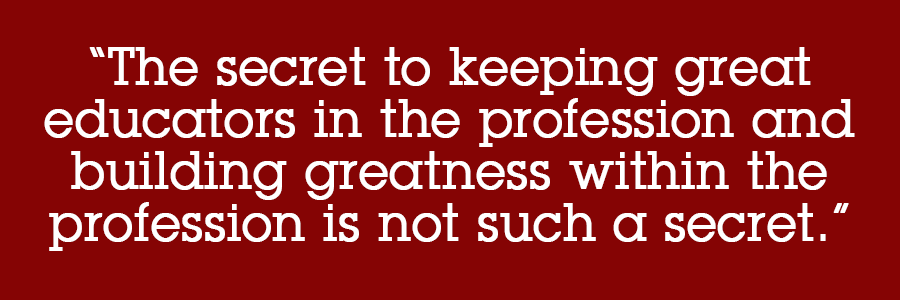After nine years of teaching, my wife gave up on the profession a few years ago and made a career change. She is now the deputy director of a government delegation to the United States, meeting with diplomats, engineering treaties, and giving speeches at the United Nations. Every day she comes home from work, she shares one thought: It is so much easier than teaching.
I write here not to praise teachers as doing “God’s work” or any such thing. Being a teacher is a hard job, much as being a doctor or a lawyer is a hard job. Why? Because teachers work with specialized knowledge that they daily employ to agilely respond to the individual needs of people who rely on their greater expertise to guide them. In this sense, legal expertise and medical expertise are much the same as educational expertise. But the fields are different in one enormous way: the support they have to do their hard work.
A team of six physicians has, on average, more than thirty people in their office helping that team through leadership and support. A team of six lawyers has, on average, about eight.
How many does a team of six teachers have in their school? Two.
Consider another statistic: on average nationally, there is a ratio of one supervisor to every fifteen teachers at a school. The ratio recommended in a typical business is generally no more than six to one.
One reason teachers are so overwhelmed is that they do not have nearly the same support—ranging from assistants who help with collecting information and writing to specialists who help manage projects, analyze data, and develop systems—as practitioners in other fields. This raises the first important question we must answer if we are to support educators as professionals: How can we bring down the ratio of support to professionals to enable them to do their job well?
But the answer is not simply to throw more support staff and supervisors at teachers. Dig deeper into this reality and a second challenge arises. The support that comes into schools is not only less than but also substantively different from that afforded experts in other professions.
In public schools, support too often comes in the form of trainers who are charged with offering workshops on new ways to do things. To find something similar in law or medicine, you have to look at what is offered to associates still in law school or residents just out of medical school. By the time lawyers are done with graduate school and engaged in their practice, they have paralegals who help them do research and mentors who help them think through their cases. By the time physicians are done with medical school, they have assistants who help them compile and make sense of patients’ information and colleagues who do rounds with them to see each others’ practice. Teachers, in contrast, keep getting more of the same, as if they were still in graduate school; when their greater experience yields deeper understanding, they are instead offered solutions from the outside and the admonition to change.
When the people coming to support you recognize your expertise and offer to help you to employ that expertise, research shows that improvements are more likely to occur and be sustained, and practice is more likely to be effective. When, on the other hand, people coming to support you tell you that you do not know how to do things well and instead that they will tell you how to do them (as too often occurs in teaching), research shows that efforts are not only ineffective but can be counter-productive, causing resistance, job dissatisfaction, and poor performance.
This raises a second important question: How can we reframe support in education to focus on enabling effective educators to do more, rather than continually trying to retrain educators on the assumption that they do not know what they are doing?
Indeed, educators are often sent the message that public schools are broken. In fact, public schools are no more “broken” than our health system is “broken” or our legal system is “broken.” In fact, all three are complex systems that rely on the wisdom and expertise of professionals to continually solve new problems. Quite frankly, our systems will always, to an extent, look a little bit broken. That is the nature of work that consists of helping other people. Doctors, lawyers, and teachers are all continually doing work that involves helping others and fixing ever-changing problems together. We owe it to teachers to give them as much support as any other professionals receive to do that work well, and to grant them as much latitude to employ their professional expertise as any other professionals.
If we stop trying to come in and fix a broken system, and instead devote the staffing and support to enable teachers to do their jobs well, perhaps we will have fewer great teachers leaving the profession to do something easier and more staying for the long haul with a team behind them to make the system work.
A third question we must then ask is: How can we get away from trying to fix a broken system and instead be smarter about working within a system to figure out all the small, daily problems we must solve together?
The secret to keeping great educators in the profession and building greatness within the profession is not such a secret, but it does require a commitment to and faith in the ability of committed professionals.

